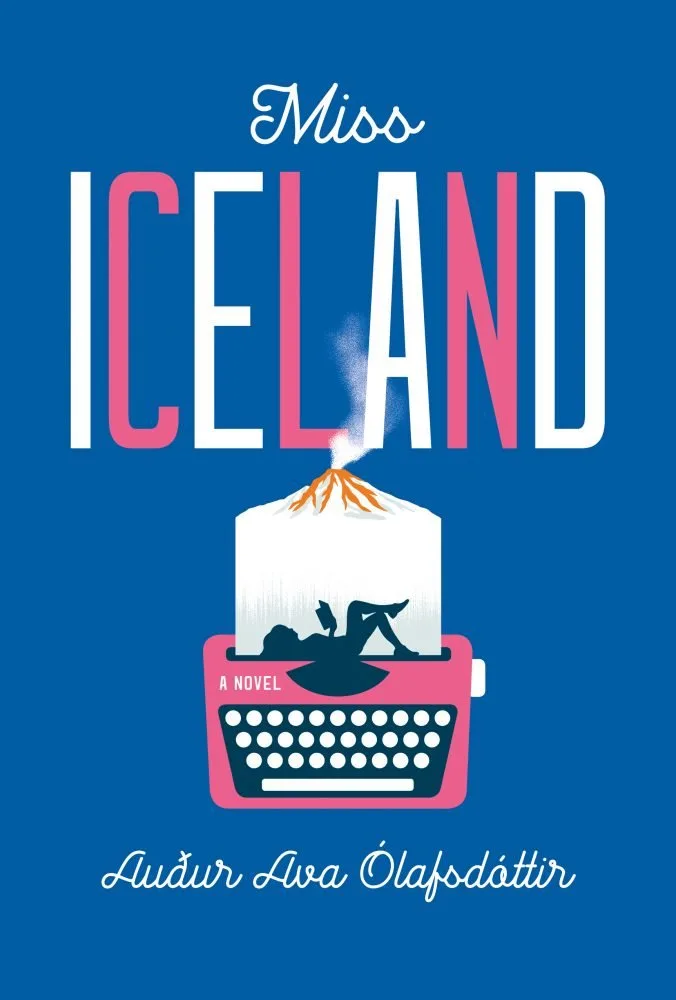Hekla’s father named her after a volcano. Four years after she was born, the volcano after which she was named erupted, and her volcano-obsessed father took Hekla in his Jeep to see the eruption. The sight forever stoked a burning fire in her, turning Hekla into a young woman who wanted nothing in the world but to be a publisher writer.
She spent her life writing poems and manuscripts, frantically chasing her dream. But in Iceland in the 1960s, Hekla had more chance of being crowned Miss Iceland than of being a published woman writer.
Read More: The Best Icelandic Books in Translation

Miss Iceland
Miss Iceland begins with a heavy, hopeful, and beautifully written romantic sentiment.
The account of her father taking Hekla to see the volcano is written as a letter from her mother to her, and it is an introductory chapter that infects the reader with the page-turner virus, so captivating is its imagery and its concept of a single sight being so awe-inspiring transforming a young child into an artist. It’s a gothic, sublime kind of idea that really excites the reader.
Beyond this moment, however, we soon learn how Olafsdottir has tricked us, in much the same way that sexist societal norms have tricked Hekla. We believe that what we are about to follow is the journey of a young, poetically minded woman with grand words on her tongue and high concepts dancing in her brain.
We will see her travel from her remote village to Reykjavik, live as a struggling artist for a while, but eventually overcome and succeed. We will peer into her mind and glimpse her beautiful poetry and visionary stories.
What we get instead is a cold slap in the face; the same slap that hits Hekla over and again. A woman in 1960s Iceland cannot be an author or a poet. It might be a land of poets and writers, a land of myths and legends, but a woman has no place amongst any of that.
Miss Iceland, through both its gripping language and its romantic execution, leads us to believe that Hekla is our hero, and that we will follow her into greatness. What we get instead is a woman arriving in Reykjavik with an English copy of Ulysses and a manuscript of her own in her bag, only to come face-to-face with the crooked and unnecessary evils of the world.
The bulk of Miss Iceland is the meandering life of a poor and struggling invisible woman. She has two best friends. One is Isey, a woman who has settled down young and given into what she has accepted is a woman’s lot in life: that of a wife and mother.
The other is Jon John, a queer man who is bullied by life and must hide his sexuality at every turn; unable to live open and free as he should be able to. Hekla spends the majority of her time with either Isey or Jon John, listening to their plights and their misery; slowly being ground down by the realities of life for anyone who was not born male and heterosexual.
Reality might be biting at Hekla’s heels, but what makes her such an endearing protagonist is her inability to stop writing. Whatever she might learn, come to see or believe, she never stops typing out her manuscripts.
It is not that she is stupid or stubborn or tenacious, but rather than she simply cannot. She writes. That is what Hekla does. And when she meets and begins a relationship with a poet, life becomes even more frustrating for Hekla. But still she writes.
Hekla herself is a smoothed out and vivid character, and the poet is a fascinating character study. He is a man with an inflated ego, but whose successes do not match it. He is arrogant and does not see the world how Hekla does; he is a man of privilege who cannot see it. Once Hekla meets him, and their relationship deepens, Miss Iceland truly becomes an engaging and enraging story to ingest.
Read More: Review of History. A Mess. (another great Icelandic novel)
Until then, however, we spend a little too much time with Jon John, who is less a character and more a mouthpiece for the queer community in the 1960s.
He has little motivation and drive of his own, and instead simply verbalises facts and truths about queer life in a homophobic society. All of this feels, unfortunately, redundant. We know what life is like for queer people, even today, in so many societies around the world.
What we need is for Jon John to be a character in his own right; a man with weight and a reason for the reader to sympathise with him, personally. Unfortunately, he comes off as being a blank, gay stereotype, which is the exact opposite to Olafsdottir’s obvious intentions.
The characterisation of Jon John is the only blip in an otherwise flawless narrative. Miss Iceland is divided up into bite-sized chapters of just a few pages, and each one dives around Reykjavik, from Hekla’s workplace to her friends’ apartments, to time spent with the poet.
The novel reads, at times, more like a journal, and that works to great effect. It has a sharp pace that doesn’t drag, especially once we meet the poet. The novel’s title, Miss Iceland, is also a scathing and biting piece of scorn. Hekla is offered and encouraged, more than once, to compete for the crown of Miss Iceland, a more achievable goal and fitting role for a woman.
And yet Hekla is also our own Miss Iceland, a young woman who would represent the female voices of Iceland in print through art and poetry, if only she could. Miss Iceland begins lyrically, with hope and volition, takes us through a grounded story that is so upsettingly bleak and real, and ends with a series of complex choices which lead to an unsatisfying resolution.
All of this makes it sound like Miss Iceland is a bitter disappointment, but it isn’t. It is the embodiment of bitter disappointment for women writers, not just in Iceland in this one decade, but in every nation in every decade. This book is the story of every woman full to bursting with artistic expression and marvellous potential who is quashed by meaningless patriarchal rules born out of fear, hate, aggression, and sadism.
Conclusion
Miss Iceland was born out of a concoction of bitterness and realism. It’s a story of countless women burdened with what they don’t want, and unable to have what they should be allowed, what they desire, what they deserve.
Hekla is a protagonist with heart and teeth, a woman we grow to love and admire, a woman trodden on by a world so ordinary and unkind. It’s a beautifully written, tightly translated, quickly paced tale about good people in a bad world.
